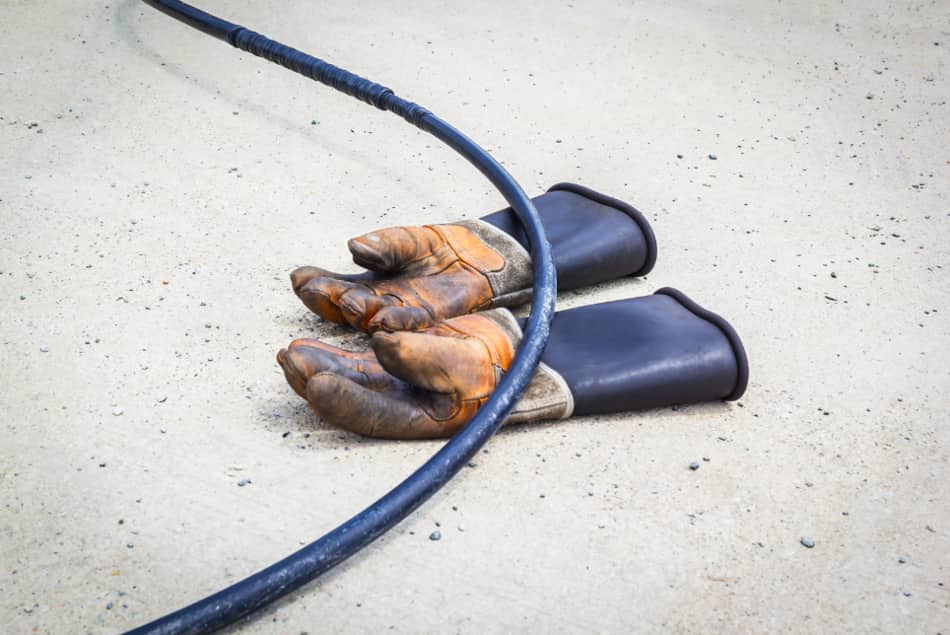Leather is one of the most popular materials for gloves. It’s also a great insulator against electric shocks-or so many people think. This article will explore whether leather can actually protect you from an electric shock and what other factors are important to consider when it comes to preventing injury by electricity.
So, do leather gloves protect against electric shock? Leather gloves can protect against electric shock when worn correctly. A good protective glove system will include wearing insulating rubber gloves and protective leather gloves. These should be able to give you adequate protection from electric shocks.
There are also some additional factors that will help to determine to what extent the leather glove is going to protect you against electric shock. In the remaining parts of this article, I’m going to share with you those additional factors. Keep reading this article to find out more! But before that, let’s take a lot at a couple of things.
Do Leather Gloves Conduct Electricity?
Leather gloves are made of animal skin, which is an insulator. This means that leather gloves do not conduct electricity.
That being said, if the gloves are wet or if there are any cracks in the leather, electricity can flow through them. In general, however, leather gloves will protect your hands from electric shock.
With leather being such an awesome insulator, you might be wondering why not just use leather gloves all the time?
The answer is that leather is not a very strong material. If you are working with high voltages, the current can burn through the gloves and shock you. For this reason, it’s important to only use leather gloves when working with low voltages.
Are Leather Gloves Safe for Electrical Work?
Having said the above, you might be wondering if leather gloves are safe for electrical work. The answer is yes, but only when used correctly.
If you are working with high voltages, make sure to use gloves that are rated for those voltages. Do not try to use leather gloves as they will not protect you from an electric shock.
What this means is there are certain types of leather gloves that are specially made for electrical work. These gloves are made of materials that can withstand high voltages without breaking down.
If you’re looking for a pair of gloves to protect you from electric shock, make sure to get a pair that is rated for the voltages you will be working with.
How Much Voltage Can Leather Gloves Take?
The Occupational Safety and Health Administration (OSHA) specifies glove types in its electrical protective equipment standard, 29 Code of Federal Regulations 1910.137.
There are six categories of gloves—00, 0, 1, 2, 3, and 4—according to the ASTM D120 Rubber Insulating Gloves Standard Specification. The following three classes handle most circumstances:
- Class 00 (Beige Label): offers protection up to 500V (AC) and 750V (DC) Max.
- Class 0 (Red Label): offers protection up to 1000V (AC) and 1,500 (DC) Max.
- Class 1 (White Label): offers protection up to 7,500V (AC) and 11,250 (DC) Max.
- Class 2 (Yellow Label): offers protection against high voltage up to 17,000V (AC) and 25,500V (DC) Max.
- Class 3 (Green Label): offers protection against high voltage up to 26,500V (AC) and 39,750V (DC) Max.
- Class 4 (Orange Label): offers protection against high voltage up to 36,000V (AC) and 54,000 (DC) Max.
So in summary, when it comes to determining how much voltage your leather gloves can take, it’s important to know the class of your gloves.
Are Leather Gloves Suitable for Electrical Sparks?
Leather gloves are great when dealing with electrical sparks. The sparks will not be able to penetrate the leather and will bounce right off.
This is because the structure of leather is such a way that it is made up of interwoven fibers that are tough and dense.
As long as you are using the right type of leather gloves for the voltage you are working with, they should protect you from electric shock and sparks.
Be sure to inspect your gloves regularly for any cracks or damage that could allow electricity to pass through.
When in doubt, always err on the side of caution and use gloves that are rated for a higher voltage than what you are working with.
What Determines How Much Protection You Get From Leather Gloves
Below are a few of the things that can help determine how much protection you can get from leather gloves when it comes to electric shocks.
1. Insulating Rubber Glove
For leather gloves to be able to offer you maximum protection against electric shocks, you will need to wear an insulating rubber glove before putting on your leather gloves.
There are also leather gloves that already come with an insulating rubber glove as some form of lining on the inside. But if you are wearing that type, make sure to change the gloves when they get wet or dirty in any way shape or form because it will compromise your protection against electric shocks.
All in all, a good way to protect yourself from electric shock is to wear a rubber glove and then put on a leather glove.
The rubber glove will stop any electricity from coming through, and the leather gloves will keep any electricity that might come through from hurting you.
The way you do this is by first putting on an insulating rubber layer before putting on your leather gloves. It’s pretty simple and straightforward.
2. Type Of Setting You’re Working In
The setting you’re working in whether a domestic setting or industrial setting could also determine whether you even need the leather gloves in the first place.
In a domestic setting, the risk of getting an electric shock is much lower because all work happens indoors and your hands won’t be in contact with high-voltage objects or wires that could conduct electricity.
In this scenario, it’s unlikely for someone to want insulated rubber gloves so leather gloves will suffice. What’s even more, you can simply shut down the power and then do your work.
In an industrial setting, the risk of electric shock is higher because you’re working alongside high-voltage machines that are in contact with live wires or objects which could conduct electricity.
In this scenario, insulated gloves would be a necessity to protect against electric shock but it’s not enough to just have rubber gloves on.
3. The Leather Glove’s Moisture Content
Another important factor that determines how much protection you will get from a leather glove against electric shock is if the glove is wet or dry.
If it’s wet, then there would be less insulation because water conducts electricity better than rubber does.
Leather as a material absorbs moisture very easily due to its porous nature. It draws in moisture when in contact with air and when it gets wet, the conductivity of the electric current is increased.
This means that if you’re working in a humid environment with your gloves being soaked from sweat and/or rainwater all at once, then your leather-glove protection will not last long against an electric shock either.
4. How The Leather Gloves Fits
The next thing that can also affect how much protection you will get from a leather glove against electric shock is the fit.
The tighter your rubber gloves are, the more electricity they can block by being in contact with less skin surface area.
So if you have small hands and tight-fitting gloves that go all the way to your wrists, then there might be even greater insulation than someone who has large hands and loose-fitting gloves going halfway up their arms.
Tips On How To Properly Use Leather Gloves To Prevent Electric Shock
- Do A Visual Inspection Of The Leather Gloves
Test your glove system properly before you always use it. You can simply air test or do a visual inspection of your gloves system before use.
As mentioned before, when working domestically, simply kill the power so you do not have to worry about even wearing leather gloves.
The best rule of thumb is to;
- Use a tester to ensure and if the circuit is shut off. Do well to check your tester on the circuit you want to work.
- Double-check to make sure it’s off.
- Now you can start to work. You can wear any type of gloves but you can even do so with your bare hands as I find that to be a lot easier and faster.
This is to say that if you’re not working with live circuits or high-voltage capacitors gloves may be unnecessary.
- Type of Workspace
Usually, when it comes to working in an industrial setting, you will find that turning power off may not be an option. This is where choosing a good glove system is imperative. In such situations, your choice of gloves including your leather and insulator gloves will depend on the voltage you’ll be working with.
In most cases wearing a pair of gloves may only be important when working with electrical voltage above 480v.
- Ensure The Leather Gloves Are The Right Fit
As mentioned before in the earlier paragraphs wearing the right size also makes a difference in how much your glove systems are going to protect you. One way of ensuring you pick out the right size of leather and insulator rubber gloves is by taking accurate measurements.
The right way to determine your glove size is to measure the circumference of your hand around the palm using a tape measure or a piece of string. Take the string and hold it between your thumb and the first knuckle of your finger.
You want to wrap around your knuckles and your palm and then return the tape or string to the thumb. Now place the measured piece of string down on a measuring tape or ruler.
If it records 7 inches, then your hand is a size 7, and so on. But it is important to allow some allowance in the case of insulator liners. Gloves are made in a range of sizes. They could range from sizes 7 to 12.
- Working On Open Circuits
You want to always wear gloves when working on open circuits. This is because mechanical and human errors can happen and you want to be ready when it does. Electricity can be very unforgiven.
- Do Not Work Barefooted
Another important tip I’m going to leave you with is to wear shoes with plastic PVC soles. This is because electricity will actually travel across the tops of your feet and up to any metal that you are wearing, which can then conduct through your body.
This is why wearing plastic or PVC soled shoes is important so that the current can not flow in through your hand and out through the moist sole of your shoe to the ground.
- Always Protect You Eyes
Last but not least, is making sure your eyes are protected at all times very key. This is because wearing leather gloves alone may not be enough in all circumstances.
Final Thoughts
Leather gloves can protect against electric shock but it is important to make sure that they fit snugly and that you are wearing them correctly. It is also important to remember to wear other protective gear such as shoes with plastic or PVC soles and eye protection. Following these tips will help to ensure your safety when working with electricity.
Also, make sure to follow all workplace and safety protocols so that you can avoid any accidents. Safety is always the number one priority. I hope you found this article helpful. Thanks For Reading!

